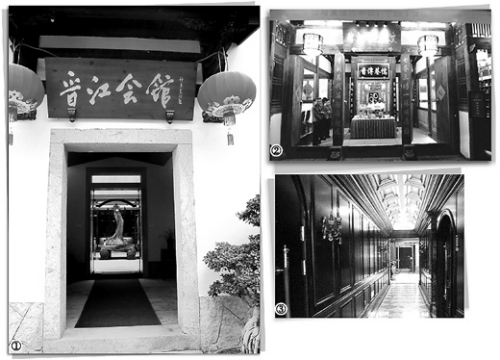
Former residences of celebrities in "San Fang Qi Xiang" turn into luxury clubs. (File Photo/ People's Daily)
Recently, Liu Xiang's Mansion, one of cultural relics under protection in Chongqing was quietly turned into a luxurious restaurant, drawing people's concern about the protection of cultural relics once again. These structures which should have been open to the public are now exclusively accessible by a certain group of people by the notice board shown at the front saying "Exclusive Club, Enter upon Invitation".
Don't expect that's anything occasional. A number of similar events were exposed to us. For example, the Jianfu Palace Hall of the Forbidden City in Beijing was transformed into a club while the Song Meiling's Villa in Nanjing was run to undertake wedding receptions. Such cultural relics were put into commercial operation relying on their cultural deposits and public values through corresponding packaging and operations, which turned to cause the harms to and/or missing of the relics due to inappropriate conduct of restructuring.
Many competent authorities made use of the relics for commercial purposes on the plea of fund shortages. Some relics' protection can only rely on assistance applied to commercial banks and/or institutions. However, noted expert on cultural relics protection Xie Chensheng, said that lack of funds is just an excuse, it is the blind pursuit of economic interests that makes so many competent organs to cross the "red line" without restraint in heritage protection.
"In a commercial society, cultural relics are a scarce resource, in which context, their protection is seen as the meat of Tang Xuanzang for its extensive profit margins in the course of urbanization construction., said Xie, "And the root should be the wrong acknowledgement of officials from up to bottom. It is contrary to the nature of protection to the relics for people to make their values market-oriented, determine their value by commodity economy theories, confirm their orientation in application depending on market effects, or even put their management under an industrialization path for the maximized economic benefits. "
There are also some problems in terms of accountability, like ill-defined relevant issues and low cost for non-compliance. "For example, it is hard to define 'destruction of historical heritages' in regard to the identification of activities constituting destruction and the degree of destruction. Therefore, relevant law enforcement may face certain difficulties. As experts said that current punishment in this regard are apparently inadequate and not bold enough in comparison with the attractive profits from commercial projects. "
How to clear the boundaries of China's cultural relics protection from items' commercial values to heritages' protection and inheritance.
In fact, operating activities are not completely forbidden in the provisions of the State Administration of Cultural Heritage by restricting to only such activities of service nature which are people-oriented and are in line with expected nature and tasks.
It has become a practice around the globe to put some historic buildings of living values and commercial values into market-oriented and commercial operation, to cover the insufficient financial investment in heritage conservation and development. However, there are detailed definitions of the range of the relics that can be brought to commercial operation and for sale on the market as well as specific principal limitations to their manner of development.
Zhou Xueying, professor of School of Histroy, Nanjing University, said that we must have a clear idea of the relationship between three pairs of interests respectively, namely long-term interest vs. short-term interest, individual interest vs. overall interest, and public interest vs. private interest, in order to achieve a balance between heritage preservation and related commercial use.
An open and transparent relics use mechanism is a desired solution to improve the regulatory strength and make up for the loopholes. Du Tao suggested getting competent sectors of cultural relics, environmental protection, land administration, planning department and expert teams involved in the examination and approval of cultural heritage related projects; meanwhile, common people may also be organized to participate in the hearing. "To establish a strict authentication system, we must invite the true experts who really understand heritage protection rather than those conductive to the approval and execution of projects; besides, what should be clearly defined is not only the subject approval body but also the way of accountability," said Lu Jiansong, professor of Department of Cultural Heritage and Museology, Fudan University.

Copyright ©1999-2011 Chinanews.com. All rights reserved.
Reproduction in whole or in part without permission is prohibited.